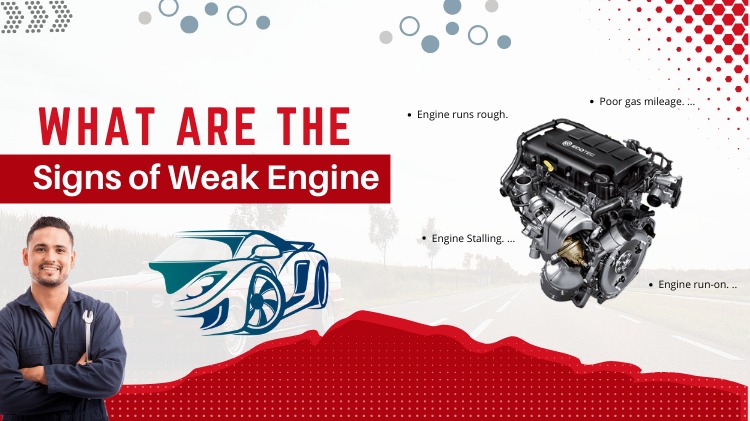An engine is the heart of any vehicle, producing the power that propels it forward. When the engine begins to exhibit symptoms of wear, it can result in poor performance, decreased fuel efficiency, and a variety of other problems. In this blog, we will look at the symptoms of a faulty engine and what causes them.
Engine Misfires:
Misfires in engines are one of the most prevalent symptoms of a faulty engine. Misfires occur when one or more of the engine’s cylinders fail to ignite the fuel and air combination at the proper time. This can cause a number of issues, including a loss of power, reduced fuel efficiency, and increased emissions.
Some common signs of engine misfires include:
• Rough Running Engine:
When the engine misfires, it can cause the vehicle to run rough. You may feel vibrations or shaking in the vehicle, and the engine may sound louder than normal.
• Loss of Power:
Misfires can result in a loss of power, particularly while accelerating. When you press the gas pedal, you may find that your vehicle responds more slowly.
• Check Engine Light:
If the engine misfires regularly, the check engine light will illuminate. A number of things can contribute to this, including malfunctioning spark plugs, ignition coils, or fuel injectors.Poor Fuel Economy:
When the engine misfires, it can lead to decreased fuel efficiency. This is because the engine is not burning the fuel and air mixture as efficiently as it should be.
• Increased Emissions:
Engine misfires can also lead to increased emissions. When the fuel and air mixture is not burned properly, it can lead to unburned fuel being released into the exhaust system, which can increase emissions.
• Engine Vibration:
Misfires can cause the engine to vibrate or shake, especially at idle. You may feel the vibration through the steering wheel or the pedals.
• Engine Stalling:
In severe cases, engine misfires can cause the engine to stall. This is because the engine is not producing enough power to keep running.
Decreased Power:
Decreased power is another common sign of a weak engine. A weak engine will struggle to produce the power needed to accelerate, climb hills or tow heavy loads. The following are some signs that your engine may be losing power:
• Sluggish Acceleration:
If your engine is weak, you may notice that your vehicle is slower to accelerate than it used to be. This can be especially noticeable when merging onto a highway or trying to pass another vehicle.
• Difficulty Climbing Hills:
A weak engine will struggle to climb steep hills or carry heavy loads. If you notice that your vehicle is struggling to climb hills that it used to handle easily, it may be a sign that your engine is losing power.
• Poor Towing Performance:
If you use your vehicle for towing, you may notice that it is struggling to tow loads that it used to handle with ease. This can be a sign that your engine is not producing enough power to handle the extra weight.
• Engine Overheating:
A faulty engine may struggle to keep up with the demands of driving, resulting in overheating. If you observe your engine running hotter than usual or the temperature gauge is in the red zone, this could indicate that your engine is losing power.
• Increased Fuel Consumption:
When your engine is struggling to produce power, it will need to work harder to keep up with the demands of driving. This can lead to increased fuel consumption, which can be a sign that your engine is losing power.
• Engine Warning Light:
If your engine is losing power, the check engine light may illuminate. A multitude of variables can contribute to this, including problems with the fuel system, ignition system, or emissions control system.
Increased Fuel Consumption:
High fuel consumption is another indicator of a faulty engine. When an engine is not operating at peak efficiency, it requires more fuel to complete the same activities. This can result in increased fuel use and higher gas prices. The following are possible indications that your engine’s fuel usage has increased:
• Decreased Fuel Efficiency:
• If your vehicle is getting fewer miles per gallon than it used to, it could be an indication that your engine is losing power. A weak engine will take more fuel to complete the same duties, resulting in worse fuel efficiency.
• Engine Overworking:
When an engine is not running at its optimal performance, it will have to work harder to perform the same tasks. This can lead to increased fuel consumption as the engine requires more fuel to keep up with the demands of driving.
• Hesitation or Jerking:
A weak engine may cause your vehicle to hesitate or jerk while accelerating. This can be a sign that the engine is not getting enough fuel or that the fuel system is not working properly.
• Dirty or Clogged Air Filter:
A dirty or clogged air filter can impede air passage to the engine, resulting in increased fuel usage.
• Engine Warning Light:
If your engine is experiencing increased fuel consumption, it may trigger the check engine light to come on. This can be caused by a variety of factors, including issues with the fuel system, ignition system, or emissions control system.
Engine Knocking:
Engine knocking is another sign of a weak engine. Engine knocking is a knocking or tapping sound that occurs within the engine when the fuel mixture detonates or explodes at the wrong time. This can be caused by a variety of factors, including poor fuel quality, excessive carbon buildup, or issues with the engine’s internal components. The following are some signs that your engine may be experiencing engine knocking:
• Knocking or Tapping Sound:
The most obvious sign of engine knocking is a knocking or tapping sound that comes from within the engine. This sound can be especially noticeable when the engine is under load, such as when accelerating or climbing hills.
• Poor Engine Performance:
Engine knocking can also cause poor engine performance, including decreased power and acceleration. You may notice that your vehicle is slower to accelerate than it used to be or that it struggles to climb hills.
• Increased Fuel Consumption:
Engine knocking can also lead to increased fuel consumption as the engine requires more fuel to compensate for the poor performance. This can lead to higher fuel costs and decreased fuel efficiency.
• Engine Overheating:
Engine knocking can also cause the engine to overheat as the fuel mixture ignites at the wrong time, which can lead to increased friction and heat within the engine.
• Engine Warning Light:
The check engine light may illuminate if your engine experiences engine knocking.
Rough Idling:
Rough idling is another sign of a weak engine. Idling is when the engine is running but the vehicle is not moving. If the engine is not running smoothly during idling, it can be a sign of a weak engine. The following are some signs that your engine may be experiencing rough idling:
• Vibrations:
If your engine is idling roughly, you may feel vibrations throughout the vehicle. These vibrations can be especially noticeable in the steering wheel, dashboard, or seats.
• Stalling:
A weak engine may also stall during idling, especially when the vehicle is stopped at a red light or stop sign. This can be a sign that the engine is not getting enough fuel or that the fuel system is not working properly.
• Unusual Noises:
A weak engine may also produce unusual noises during idling, such as clicking, popping, or hissing sounds. These sounds can be a sign that the engine is not running smoothly and may need to be inspected by a qualified mechanic.
• Decreased Performance:
Rough idling can also lead to decreased engine performance, including decreased power and acceleration. You may notice that your vehicle is slower to accelerate than it used to be or that it struggles to climb hills.
• Engine Warning Light:
If your engine is experiencing rough idling, it may trigger the check engine light to come on.
Smoke from the Exhaust:
Smoke from the exhaust is another sign of a weak engine. When an engine is not running at its optimal performance, it can produce excessive smoke from the exhaust. The color and thickness of the smoke can help identify the cause of the problem. The following are some signs that your engine may be producing smoke from the exhaust:
• White Smoke:
If your engine is producing white smoke from the exhaust, it can be a sign of a coolant leak. This can be caused by a blown head gasket, a cracked engine block, or other issues with the cooling system.
• Blue Smoke:
If your engine is producing blue smoke from the exhaust, it can be a sign of burning oil. This can be caused by worn piston rings, valve seals, or other issues with the engine’s internal components.
• Black Smoke:
If your engine is producing black smoke from the exhaust, it can be a sign of a fuel-related problem. This can be caused by issues with the fuel injectors, fuel pressure regulator, or other components of the fuel system.
• Excessive Smoke:
If your engine is producing excessive smoke from the exhaust, regardless of the color, it can be a sign of a more serious engine problem. This can include issues with the engine’s internal components, such as worn or damaged pistons, valves, or bearings.
• Engine Warning Light:
If your engine is producing smoke from the exhaust, it may trigger the check engine light to come on. This can be caused by a variety of factors, including issues with the fuel system, ignition system, or emissions control system.
Engine Stalling:
Engine stalling is another sign of a weak engine. Stalling occurs when the engine suddenly shuts off or loses power while the vehicle is in motion. There are several reasons why an engine may stall, including issues with the fuel system, ignition system, or engine components. The following are some signs that your engine may be experiencing stalling:
• Rough Idling:
If your engine is idling roughly, it may be more prone to stalling. This can be caused by issues with the fuel system, ignition system, or other engine components.
• Poor Acceleration:
If your engine is struggling to accelerate, it may be more prone to stalling. This can be caused by issues with the fuel system, ignition system, or engine components.
• Unusual Noises:
If your engine is producing unusual noises, such as knocking or ticking sounds, it may be more prone to stalling. This can be a sign that the engine is not running smoothly and may need to be inspected by a qualified mechanic.
• Engine Warning Light:
If your engine stalls, it may cause the check engine light to illuminate. A multitude of variables can contribute to this, including problems with the fuel system, ignition system, or emissions control system.
• Fuel Smell:
If you smell gasoline or other fuel odors while driving, it may be a sign that your engine is stalling. This can be caused by a leak in the fuel system or other issues with the engine.
Strange Noises:
Strange noises are another sign of a weak engine. The following are some common engine noises that can indicate a problem:
• Knocking or Pinging:
Knocking or pinging noises are often a sign of problems with the engine’s combustion process. This can be caused by issues with the fuel system, ignition system, or engine components.
• Ticking or Rattling:
Ticking or rattling noises can be a sign of a loose or damaged component in the engine, such as a valve lifter or piston ring. It can also be caused by low oil pressure or other lubrication issues.
• Hissing or Whistling:
Hissing or whistling noises can be a sign of a leak in the engine’s air intake system, which can affect the engine’s performance and fuel efficiency.
• Grinding or Screeching:
Grinding or screeching noises can be a sign of problems with the engine’s rotating components, such as the bearings or pulleys. It can also be caused by issues with the accessory drive belt or timing belt.
• Squealing or Chirping:
Squealing or chirping noises can be a sign of a worn or damaged accessory drive belt, such as the serpentine belt, which drives the alternator, power steering pump, and other components.
Poor Acceleration:
Poor acceleration is another sign of a weak engine. The following are some common signs of poor acceleration:
• Sluggish Performance:
If your engine is running sluggishly, it may be a sign that it is not producing enough power. This can be caused by issues with the fuel system, ignition system, or engine components.
• Delayed Response:
If your engine is slow to respond when you press the accelerator pedal, it may be a sign of a weak engine. This can be caused by issues with the throttle system, fuel injectors, or other engine components.
• Reduced Power:
If your engine is not producing as much power as it used to, it may be a sign of a weak engine. This can be caused by a variety of factors, including worn or damaged engine components, low oil pressure, or other mechanical issues.
• Poor Fuel Economy:
If your engine is not performing efficiently, it may be using more fuel than it should. This can be a sign of a weak engine, as the engine is not able to convert fuel into power as efficiently as it should.
• Engine Warning Light:
If your engine is not accelerating properly, the check engine light may illuminate. A multitude of variables can contribute to this, including problems with the fuel system, ignition system, or emissions control system.
Engine Overheating:
Engine overheating is another sign of a weak engine. The following are some common signs of engine overheating:
• Temperature Gauge:
If your engine overheats, the temperature indicator on your dashboard will reflect it. If the gauge is in the red zone or above the standard operating range, it indicates an engine problem.
• Steam or Smoke:
If you observe steam or smoke emerging from the engine compartment, it is a sign that the engine is overheating. This can be caused by a number of things, including a faulty cooling system or an engine leak.
• Burning Smell:
If you smell burning coming from the engine compartment, it is a sign of engine overheating. This can be caused by a variety of factors, including overheated engine components or leaking fluids.
• Reduced Performance:
If your engine is overheating, it may not be able to produce as much power as it should. This can result in reduced performance, such as slower acceleration or reduced top speed.
• Engine Warning Light:
If your engine is overheating, it may trigger the check engine light to come on. This can be caused by a variety of factors, including issues with the cooling system, engine components, or emissions control system.
Read Also: At What Mileage Engine Should be Replaced
Conclusion
To keep your vehicle operating smoothly, you should be aware of various indicators of a poor engine. Engine misfires, decreased power, higher fuel consumption, engine banging, rough idling, smoke from the exhaust, engine stalling, unusual noises, poor acceleration, and engine overheating are some of the symptoms.
If you notice any of these symptoms, have your engine checked by a qualified mechanic as soon as possible. Ignoring these warning signs may result in more catastrophic problems later on, such as engine damage or failure. A professional mechanic can identify the source of the problem and offer solutions to keep your engine running smoothly and avoid future costly repairs.
Routine maintenance, like as oil changes, tune-ups, and other routine repairs, can also assist to prevent these difficulties and keep your engine running at peak performance. To guarantee the lifetime and dependability of your vehicle, adhere to the maintenance plan and fix any concerns as soon as they develop.






